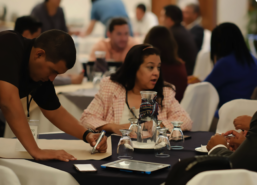Posted on 03 Jun 2020
With the global pandemic, the world has prioritized health, and rightly so. But in the criminal-justice context, there are serious questions about how the state should prioritize the response.
To say COVID-19 has changed the world would be an understatement. The virus has led to a global public-health emergency that has affected not only healthcare, education, social institutions and the economy, but also criminal-justice systems all over the world.
During the pandemic, a spotlight has been shone on prisons, which have been described as petri dishes of contagion. But courts, too, are struggling to adapt procedures to meet distancing restrictions, while law-enforcement officers must balance their policing duties with efforts to minimize the risk of transmission between themselves and their communities. As the months wear on, states are adapting laws to tackle governance challenges in societies under lockdown, including dealing with new coronavirus-related crimes.
COVID-19’s profound impact on the criminal-justice sector has not only disrupted day-to-day activities and revealed shortcomings, but has also sparked responses that may have long-term implications for the administration of justice.
As with many other state institutions, courtrooms all over the world are either closed, maintaining bare-bones services for urgent matters, or making increased use of technology, like tele-conferencing. Many courts have limited or ended jury trials and other in-person proceedings. While these steps may help prevent the spread of coronavirus, they raise concerns about the rights of defendants to face their accusers and may increase the potential for biases to influence trials. These issues can be exacerbated during cooperation on criminal matters (including organized crime) between courts in different countries.
Alternative measures include postponing trials, extending court deadlines and waiving court and penalty fees, but these, too, are causes for concern. Even before the outbreak, court systems around the world were frequently congested and under-funded, and coronavirus-related postponements and fee waivers will undoubtedly contribute to these underlying problems, which have the potential to compromise basic legal rights. Courts face a quantity-versus-quality dilemma, where delayed justice may mean no justice. It seems that for courts around the world, every ‘quick fix’ creates new cracks in the system. Officials should take these troubling times as an opportunity to search for new ways to streamline and improve the delivery of justice.
The pandemic has also disrupted law enforcement. Keeping the public safe has always been the role of police officers as first responders, but with the global pandemic, they must find ways to do so without becoming infected or infecting others. Many jurisdictions are relying more on citations and less on custodial arrests. Similarly, police investigations have been forced to slow down, and this has serious implications for criminal proceedings. In many cases, there is a limited window of opportunity to collect evidence, and missing it due to COVID-19 restrictions could change the outcome of a trial.
But the global pandemic’s impact on criminal-justice systems is perhaps nowhere more evident than in prisons. The World Health Organization has identified prisons as high-risk areas for the spread of the coronavirus and stressed the importance of improving conditions to slow transmission. In the United States, for example, it was reported in early May, that prisons comprise eight of the top 10 infected institutions, with a single prison in Ohio state identified as the largest known source of coronavirus infections in the country.
Overcrowding in prisons makes social distancing practically impossible. Many incarcerated people are already medically vulnerable to infection, and prison hygiene is often insufficient to prevent transmission. Staff and visitors who come in and out of prisons may unknowingly introduce the virus to prisoners.
In response, many countries are taking action to reduce prison populations, mainly through early release of some detainees, such as the elderly, the medically vulnerable, pre-trial detainees and those already nearing the end of their sentence. Some have also granted pardons on humanitarian grounds. People who remain in prison have experienced increased restrictions and the elimination of visitation rights – conditions that have resulted in prison riots around the world, including in Italy, Colombia and Thailand.
COVID-19-related restrictions have raised serious human-rights concerns. The UN High Commissioner for Human Rights recently cautioned that states are still obligated to abide by the Nelson Mandela Rules on the treatment of prisoners, and encouraged measures like increased phone time and email privileges. The health crisis has also made people question the number of people who are sent to prison in the first place. Police officers and prosecutors alike are having to exercise discretion and prioritize who is arrested and charged.
Beyond the immediate impact of these measures, a number of questions have been raised about the overall state of prison systems. For many of the people who have been released early during this period, was there a need to lock up them in the first place? Particularly for countries that are known for mass incarceration, considerations about whether societies are better served by punitive or rehabilitative justice are coming to light. On the other hand, while mass amnesty and leniency can help reduce the risk of viral spread, they raise concerns about public safety more generally and the weakening of the deterrence effect of prison sentences.
Unfortunately, in these uncertain and unprecedented times, existing crimes are not the only problem. The pandemic has given rise to new crimes, and states are struggling to deal with them in ways that may affect their legal systems even after the coronavirus is better controlled or eliminated. The effects of the criminal-justice system’s actions today may linger even after the pandemic dissipates. For example, some states are applying criminal law (both COVID-19-specific and general provisions) to violations of quarantine orders.
More serious offences take advantage of the health crisis by creating new crimes or increasing old ones. While some crimes (such as traffic offences, burglaries and even some forms of organized crime) have dropped, others (such as fraud, cybercrime and assault) have been on the rise during the pandemic.
Countries have responded to COVID-19-related crime both by creating pandemic-specific laws and regulations and by applying existing provisions. A number of questions arise in enforcing both. For example, is it possible to prove that coughing on someone was intentional? When prisons are seeking to minimize the number of inmates, does it make sense to have laws that may imprison more people? How can human rights be upheld while enforcing these measures?
During public-health emergencies, like during wars, extraordinary powers may be introduced to protect the greater good, though international bodies have regularly stated that such powers must always be tested for necessity and proportionality. Crucially, they must always have a time limit, without which extreme measures could become normalized.
With the global pandemic, responding to the health crisis has been the priority. But in the criminal-justice context, this leaves serious questions about what to prioritize next. The interaction between public order, law-enforcement capacity, human rights, rehabilitation and punishment may need to be reconsidered – now and in the post-COVID-19 world.



